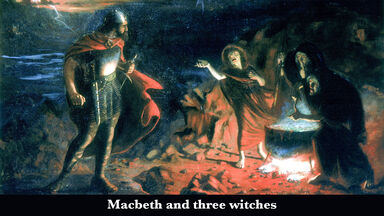In 1054 Siward invaded Scotland in the interests of his kinsman Malcolm Canmore, and he completely routed King Macbeth in a battle in which his son Osbeorn was killed.
Another storied stone is called the Witches' Stone, because it marks the place near Forres where Macbeth is said to have encountered the weird sisters.
The feud between these two princes originated probably in a dispute over the succession to the throne; its details, however, are obscure, and the only fact which can be ascertained with any certainty is that Duncan was slain by Macbeth in 1040.
Duncan left sons, Malcolm, called Canmore (great head), and Donald Ban; and in 1054 Siward, earl of Northumbria, defeated Macbeth, whether acting under the order of Edward the Confessor in favour of the claims of Malcolm Canmore, or merely to punish Macbeth for sheltering Norman fugitives from the Confessor's court.
Between this drama and its successor, Die Brazil von Messina, Schiller translated and adapted to his classic ideals Shakespeare's Macbeth (1801) and Gozzi's Turandot (1802).





